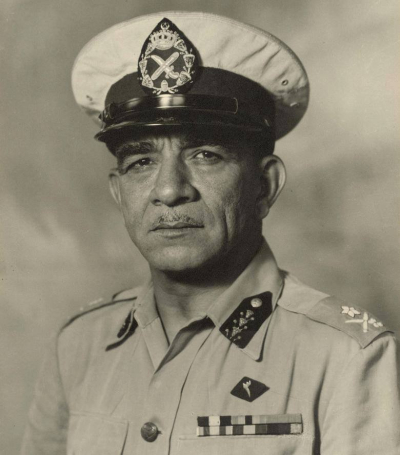The Egyptian Revolution of 1952 (Arabic: 23 1952), also known as the 1952 Coup d'etat (Arabic: 1952) and 23 July Revolution, was a period of profound political, economic, and societal change in Egypt that began on 23 July 1952 with the toppling of King Farouk in a coup d'etat by the Free Officers Movement, a group of army officers led by Mohamed Naguib and Gamal Abdel Nasser. The Revolution ushered in a wave of revolutionary politics in the Arab World, and contributed to the escalation of decolonisation, and the development of Third World solidarity during the Cold War.
Though initially focused on grievances against King Farouk, the movement had more wide-ranging political ambitions. In the first three years of the Revolution, the Free Officers moved to abolish the constitutional monarchy and aristocracy of Egypt and Sudan, establish a republic, end the British occupation of the country, and secure the independence of Sudan (previously governed as an condominium of Egypt and the United Kingdom). The revolutionary government adopted a staunchly nationalist, anti-imperialist agenda, which came to be expressed chiefly through Arab nationalism, and international non-alignment.
The Revolution was faced with immediate threats from Western imperial powers, particularly the United Kingdom, which had occupied Egypt since 1882, and France, both of whom were wary of rising nationalist sentiment in territories under their control throughout Africa, and the Arab World. The ongoing state of war with the State of Israel also posed a serious challenge, as the Free Officers increased Egypt's already strong support of the Palestinians. These two issues converged in the fifth year of the Revolution when Egypt was invaded by the United Kingdom, France, and the State of Israel in the Suez Crisis of 1956 (known in Egypt as the Tripartite Aggression). Despite enormous military losses, the war was seen as a political victory for Egypt, especially as it left the Suez Canal in uncontested Egyptian control for the first time since 1875, erasing what was seen as a mark of national humiliation. This strengthened the appeal of the revolution in other Arab countries.
Wholesale agrarian reform, and huge industrialisation programmes were initiated in the first decade and half of the Revolution, leading to an unprecedented period of infrastructure building, and urbanisation. By the 1960s, Arab socialism had become a dominant theme, transforming Egypt into a centrally planned economy. Official fear of a Western-sponsored counter-revolution, domestic religious extremism, potential communist infiltration, and the conflict with the State of Israel were all cited as reasons compelling severe and longstanding restrictions on political opposition, and the prohibition of a multi-party system. These restrictions on political activity would remain in place until the presidency of Anwar Sadat from 1970 onwards, during which many of the policies of the Revolution were scaled back or reversed.
The early successes of the Revolution encouraged numerous other nationalist movements in other countries, such as Algeria, where there were anti-imperialist and anti-colonial rebellions against European empires. It also inspired the toppling of existing pro-Western monarchies and governments in the MENA region.
The Revolution is commemorated each year on 23 July.
Mohamed Naguib (full name: Mohamed Bey Naguib Youssef Qutb El-Qashlan Arabic: الرئيس اللواء محمد بك نجيب يوسف قطب القشلان, Egyptian Arabic pronunciation: [mæˈħæmmæd næˈɡiːb]; 19 February 1901 – 28 August 1984) was an Egyptian revolutionary, and, along with Gamal Abdel Nasser, one of the two principal leaders of the Egyptian Revolution of 1952 that toppled the monarchy of Egypt and Sudan, leading to the establishment of the Republic of Egypt, and the independence of Sudan.
A distinguished and decorated general who was wounded in action in the Palestine War of 1948, he became the leader of the Free Officers Movement of nationalist army officers opposed to the continued presence of British troops in Egypt and Sudan, and the perceived corruption and incompetence of King Farouk. Following the toppling of Farouk in July 1952, Naguib went on to serve as the head of the Revolutionary Command Council, the prime minister, and first president of Egypt, successfully negotiating the independence of Sudan (hitherto a condominium of Egypt and the United Kingdom), and the withdrawal of all British military personnel from Egypt. His tenure as president came to end in November 1954 due to disagreements with other members of the Free Officers, particularly with Nasser, who would go on to succeed him as president.

1952Jul, 23
General Muhammad Naguib leads the Free Officers Movement (formed by Gamal Abdel Nasser, the real power behind the coup) in overthrowing King Farouk of Egypt.
Choose Another Date
Events on 1952
- 2May
De Havilland Comet
The world's first ever jet airliner, the De Havilland Comet 1 makes its maiden flight, from London to Johannesburg. - 3Jul
RMS Queen Mary
The SS United States sets sail on her maiden voyage to Southampton. During the voyage, the ship takes the Blue Riband away from the RMS Queen Mary. - 7Jul
SS United States
The ocean liner SS United States passes Bishop Rock on her maiden voyage, breaking the transatlantic speed record to become the fastest passenger ship in the world. - 15Sep
Eritrea
The United Nations cedes Eritrea to Ethiopia. - 20Oct
Mau Mau Uprising
Governor Evelyn Baring declares a state of emergency in Kenya and begins arresting hundreds of suspected leaders of the Mau Mau Uprising, including Jomo Kenyatta, the future first President of Kenya.

 English
English  español
español  français
français  português
português  русский
русский  العربية
العربية  简体中文
简体中文 